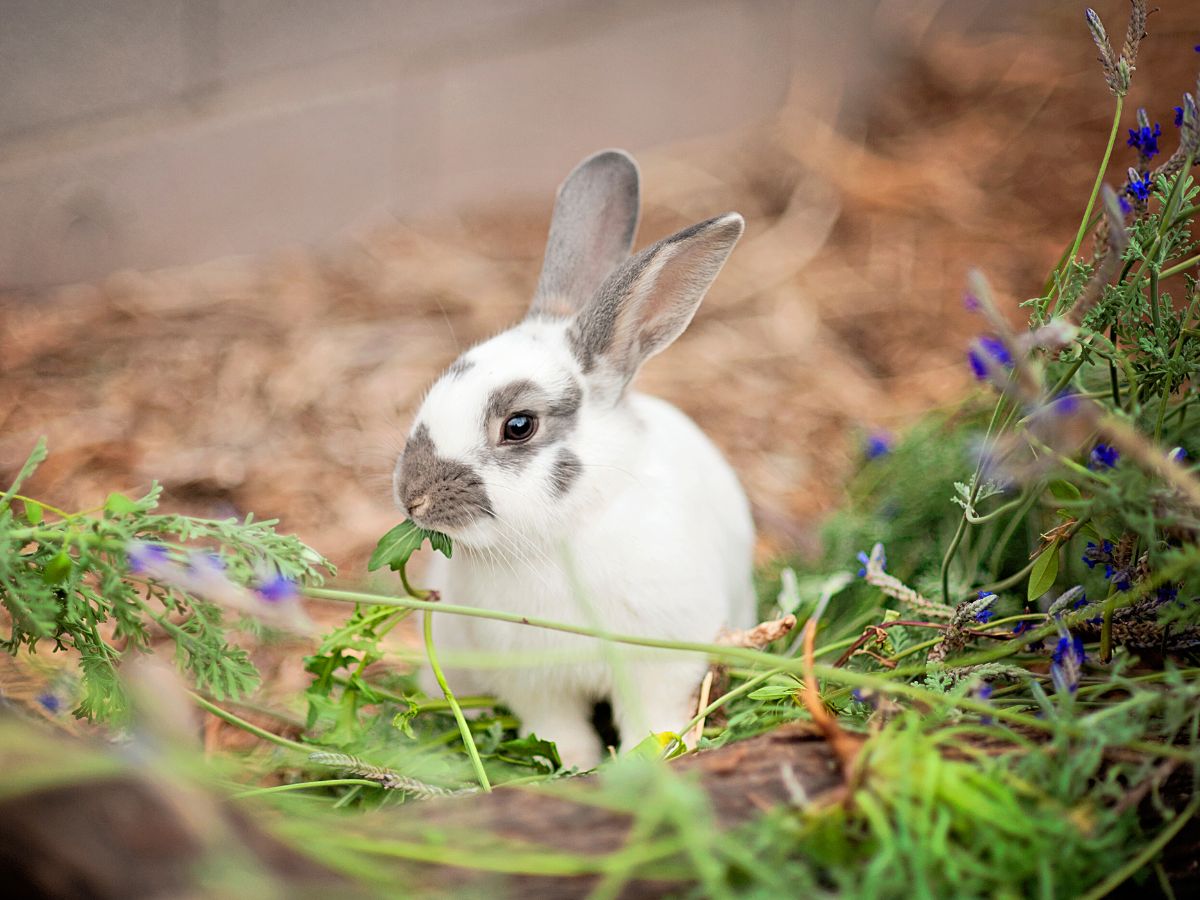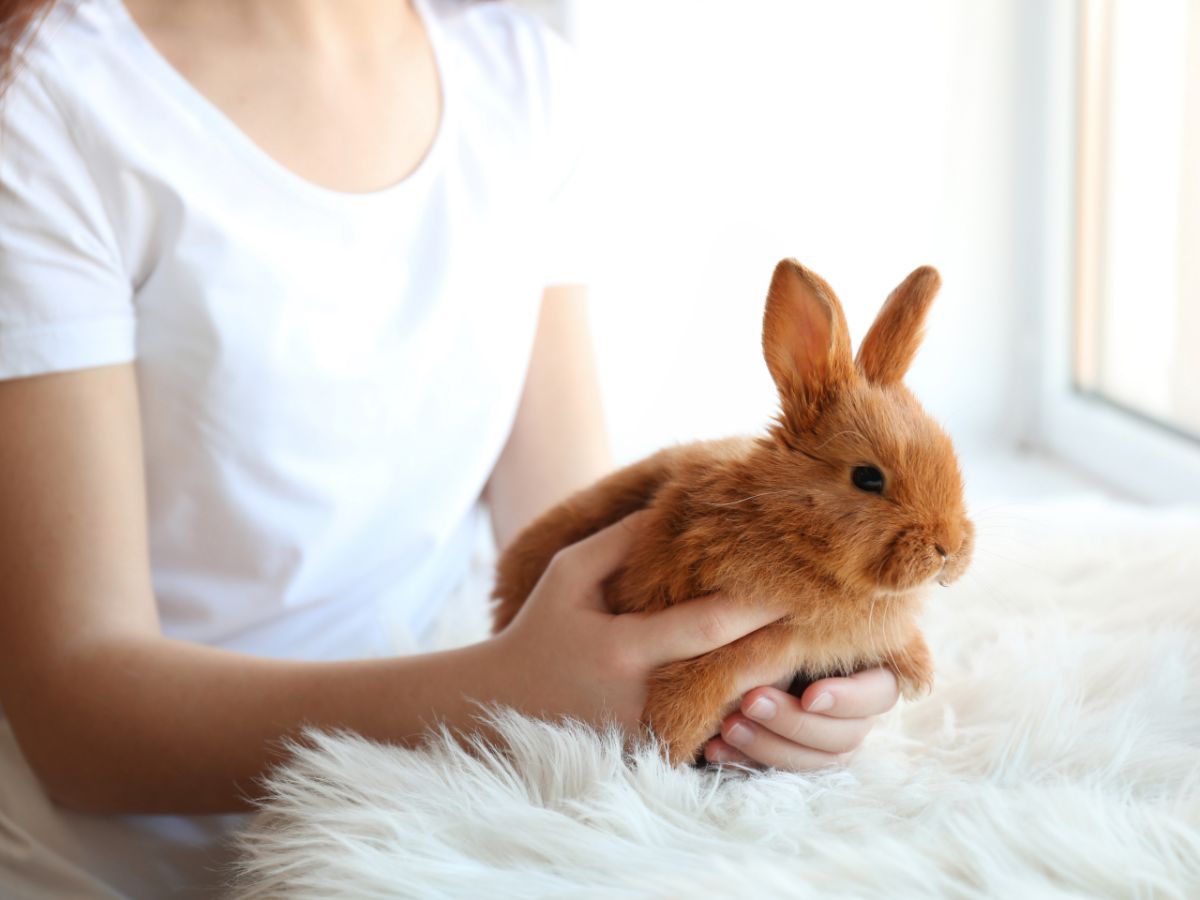Rabbits are natural grazers and enjoy having access to fresh and dried herbs and plants. While a rabbit’s diet consists predominantly of hay and fresh water, you can provide it with a balanced and nutritional diet by adding some of its favorite herbs to its food bowl.
Rabbits can eat a wide variety of herbs. The most common herbs that are safe for rabbits to eat include parsley, thyme, rosemary, mint, sage, and coriander. Ideally, you should give your rabbit around one cup of vegetables and fresh herbs daily as part of a balanced diet.
If you want to know how much of your rabbit’s diet should consist of herbs and fresh greens, you’re in luck. We’ve also listed a few of the most common herbs that are safe for rabbits to eat.
Contents
Safe Herbs To Give Your Rabbit
There are plenty of yummy herbs that you can give your rabbit. Some herbs may need to be given in smaller doses to avoid an upset stomach, but most of them are fine to give your bunny as part of its daily intake.
Some herbs also have medicinal qualities that can ease uncomfortable symptoms in your rabbit. However, herbs should never be used as a replacement for proper medication and treatment. So, if your bunny is a little under the weather, it may be best to get it to a vet as soon as possible.
1. Parsley
Parsley is entirely safe to give to your rabbit in small doses. It should be given sparingly, though, and shouldn’t be given to your bunny more than two to three times a week.
Parsley should only be given to your rabbit occasionally because it contains a chemical called oxalates. This chemical is found in some other leafy greens and is fine for your pet in small doses. But if you give your rabbit parsley too frequently, this chemical will build up and can cause liver damage.
On the other hand, parsley contains several essential vitamins, minerals, and nutrients that can positively affect your rabbit’s health. Parsley can help to reduce the risk of heart disease, reduce joint pain in older rabbits, and help to prevent and fight infections.
2. Thyme
Thyme is another rabbit-safe herb option that you can feed your bunny. Unlike parsley, you can give your rabbit thyme every day! You can also use the dried thyme to sprinkle over their pellets for a delicious surprise.
Thyme contains essential nutrients like vitamin A, potassium, and magnesium. It is also naturally high in fiber, which can help to ease digestive discomfort and diarrhea. It’s important to remember that if your pet has diarrhea, you’ll need to consult your local vet right away rather than treating their symptoms with herbs.
3. Rosemary
Rosemary makes for a fantastic addition to your rabbit’s diet. But, because this is considered a fragrant herb, you shouldn’t be surprised if your bunny turns its nose up! Some rabbits enjoy aromatic herbs, while others strongly dislike strong-smelling plants.
You can give your rabbit the sprigs and stems of rosemary as a delicious treat. It would be best if you never give your pet more than a few stems and sprigs. Instead, you’ll need to focus on providing your rabbit with a good variety of herbs and vegetables as part of its daily greens.

4. Mint
Mint is another strong-smelling herb that your rabbit may enjoy. But like rosemary, your rabbit may not enjoy the taste of such a fragrant plant. Mint has tons of nutritional benefits for your bunny, though. So, if it enjoys the taste of mint, it can indulge as much as it likes!
Mint contains vitamin A, magnesium, copper, and many other essential nutrients that make up a healthy rabbit diet. It can also help to ease digestive upset or discomfort. Like any herb, however, you will need to consult your vet on how to treat your rabbit’s upset tummy rather than relying on herbs to solve the issue.
5. Sage
While sage is thought to have medicinal properties in humans, it’s largely unresearched with rabbits. But that shouldn’t stop you from adding this herb into your bunny’s diet! Sage contains beneficial nutrients like vitamin K and iron, which are great for providing your pet with a healthy and balanced diet.
You can give your rabbit sage stems and leaves, but you should restrict the amount that you give them to one or two stems per day. Like other herbs, you should aim to give your rabbit a variety of yummy plants to prevent boredom with its diet and to avoid giving them too much of one particular herb.
6. Coriander
Coriander – also known as cilantro – can be given to your rabbit by the handful! Along with hay and fresh water, coriander is an excellent way to mix up your rabbit’s diet. This herb contains plenty of potassium, iron, and vitamin K to provide growing bunnies with good nutritional value.
Coriander may be considered an aromatic herb. If your bunny doesn’t enjoy the smell, it’s best to swap it out for a different herb to ensure that your rabbit is only munching down on its favorite herbs every day.
Herbs As Part Of A Rabbit’s Diet
A rabbit’s diet consists of hay, pellets, fresh fruits and vegetables, and delicious herbs! Most rabbit owners enjoy giving their bunnies herbs as a treat or tasty snack. But, while rabbits can eat various plants and herbs, it’s essential to know which ones are safe for your pet to eat – and which aren’t.
Your rabbit should have a good supply of hay available every day. You should give your rabbit around a cup of vegetables or greens daily, including herbs! This hay will make up around 90 percent of your rabbit’s diet, so any other food you give it will be relatively small in comparison.
You can decide the ratio of herbs and veggies you want to give your bunny. However, it’s important to note that younger bunnies may need time to adjust to new foods, so you should introduce new herbs slowly.
Conclusion
There are a variety of herbs that are safe for rabbits. Our list includes some of the most common- and easily accessible – herbs you can give your rabbit as part of its daily food intake. Just remember to provide your bunny with plenty of hay and fresh water, too!




